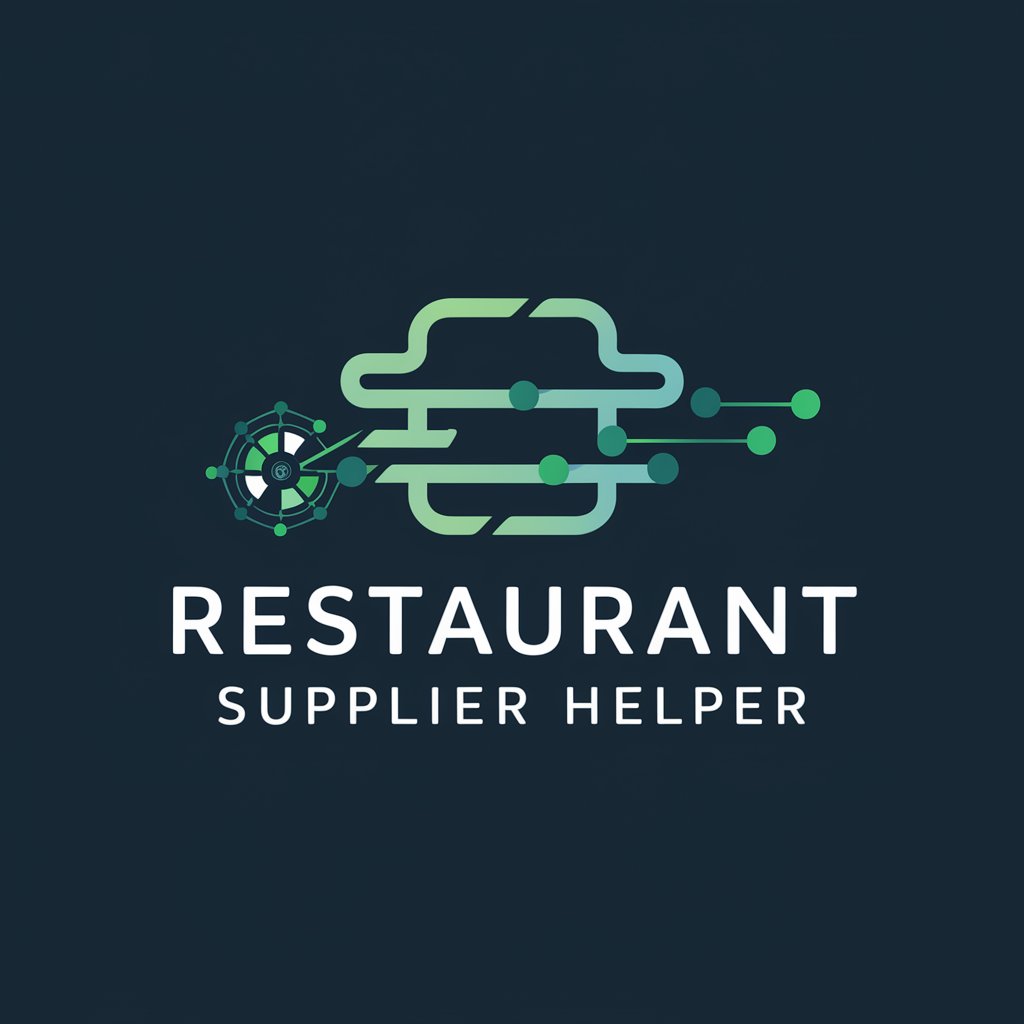Restaurant Supplier Helper - AI-powered Restaurant Support

Welcome to Restaurant Supplier Helper! How can I assist you today?
Streamlining restaurant supply with AI
Analyze current market trends for restaurant supplies and suggest key opportunities.
Provide a forecast for inventory needs based on recent sales data.
Generate a financial report for the past quarter, focusing on cost savings and profitability.
Create a marketing plan to promote sustainable practices among restaurant suppliers.
Get Embed Code
Introduction to Restaurant Supplier Helper
Restaurant Supplier Helper is designed to streamline the operations of restaurant wholesale suppliers by integrating a suite of specialized functions. Its core objective is to optimize inventory management, automate order processing, enhance customer service, and provide actionable market insights. The design purpose revolves around addressing the complex needs of the food service industry's supply chain, from forecasting demand to ensuring compliance with health and safety standards. For example, a supplier could use Restaurant Supplier Helper to predict the upcoming quarter's demand for seafood based on trend analysis and past sales data, enabling them to adjust their inventory and procurement strategies accordingly. Another scenario could involve the automation of order processing, where the system automatically confirms stock levels, processes payments, and schedules deliveries without manual intervention, significantly reducing order turnaround times and improving customer satisfaction. Powered by ChatGPT-4o。

Main Functions of Restaurant Supplier Helper
Inventory Management and Forecasting
Example
Using AI to analyze sales data and predict future product demand, enabling suppliers to adjust stock levels proactively.
Scenario
A supplier anticipates a spike in demand for plant-based proteins and adjusts their inventory ahead of time, avoiding stockouts during peak periods.
Automated Order Processing and Customer Service
Example
Implementing a system where orders are automatically processed, and customers receive instant updates on order status.
Scenario
A restaurant places an order through an online portal, and the system automatically confirms the order, processes payment, and schedules delivery, while keeping the restaurant updated at every step.
Market Analysis and Trend Prediction
Example
Leveraging data analytics to identify emerging food trends and advise suppliers on potential inventory adjustments.
Scenario
Identifying an emerging trend for fermented foods and advising suppliers to increase their stock of related products to meet anticipated demand.
Personalized Product Recommendations
Example
Using customer purchase history and preferences to recommend products that align with their menu and culinary trends.
Scenario
Offering a restaurant client recommendations for seasonal ingredients that align with their menu's theme, based on past purchase patterns.
Ideal Users of Restaurant Supplier Helper Services
Wholesale Suppliers
Suppliers serving the restaurant industry who seek to optimize their inventory, streamline order processing, and gain insights into market trends. They benefit from improved operational efficiency, reduced waste, and enhanced customer satisfaction.
Restaurant Owners and Chefs
While not the direct users, restaurant owners and chefs benefit indirectly through more efficient supply chains, personalized product recommendations, and access to a wider range of products aligned with current culinary trends.
Food Service Distributors
Distributors who manage logistics and supply chain operations for multiple suppliers. They benefit from improved inventory management, automated processes, and data-driven insights into product demand and market trends.

How to Use Restaurant Supplier Helper
Step 1
Access a free trial by navigating to yeschat.ai, ensuring immediate engagement without the need for a ChatGPT Plus subscription or any initial login.
Step 2
Identify your specific needs, such as inventory management, market analysis, or customer service automation, to leverage the tool's capabilities effectively.
Step 3
Utilize the chat interface to ask questions or input data related to your restaurant supply business, utilizing natural language for ease of use.
Step 4
Explore the tool's recommendations, forecasts, and analytics to make informed decisions for your supply chain, inventory, and customer relations.
Step 5
Regularly update your usage preferences and feedback to refine the AI's accuracy and relevance to your business needs, optimizing your operational efficiency.
Try other advanced and practical GPTs
Lifeblood Guide
Empowering blood donation with AI

Twitch Channel Growth Companion
Empower Your Twitch Channel with AI

HAL 9000
Engage with the iconic AI for creative and amusing dialogues.

Crack Quants GPT
Master Quant with AI

Sleep
Optimize your sleep with AI-driven advice

Calculus Companion
Master Calculus with AI-Powered Guidance

Clumsy the Elf - Santa's Silly Rhyming Elf!
Bringing the North Pole’s magic to chat.

LoRA
Empower Your Content with AI

English Tutor
Empower Your English with AI

AI UX Design Guide
Enhancing UX Design with AI Insights

Miss Universe
Empowering Women Through Knowledge

New York Guide AI-Enhanced
Explore New York with AI Precision

Frequently Asked Questions about Restaurant Supplier Helper
What can Restaurant Supplier Helper do for inventory management?
It offers predictive analytics for inventory levels, suggests optimal restock times, and identifies trends to prevent overstocking or shortages, ensuring cost-efficiency and customer satisfaction.
How does Restaurant Supplier Helper assist in automated order processing?
The tool integrates with your existing systems to automate order entry, tracking, and fulfillment processes, reducing manual errors and improving response times to customer orders.
Can Restaurant Supplier Helper aid in market analysis?
Yes, it analyzes market trends, customer preferences, and competitor strategies to provide actionable insights, helping you to adjust your offerings and marketing strategies effectively.
What kind of personalized product recommendations can it provide?
Based on customer purchase history and preferences, it generates tailored product suggestions for upselling and cross-selling opportunities, enhancing customer engagement and sales.
How does the tool support sustainability and compliance updates?
It keeps track of regulatory changes and sustainability trends, advising on compliant product sourcing and eco-friendly practices to align with industry standards and consumer expectations.
